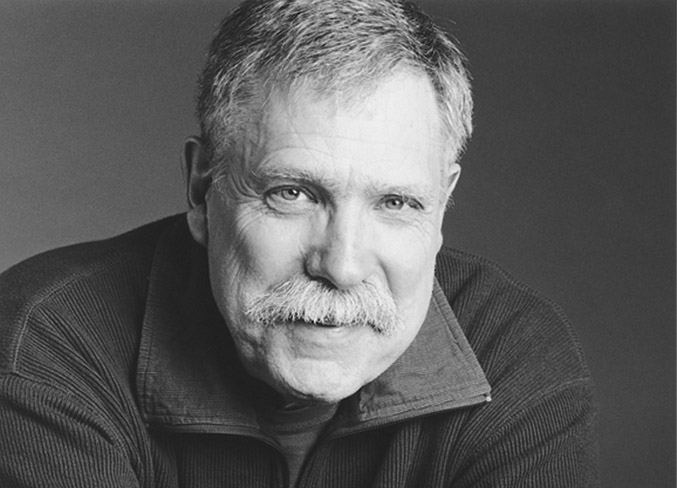
Ted Blodgett (photo: Yukiko Onley)
Edmonton is widely referred to as the City of Champions, and while this decidedly sports-centric and often contentious description may be bordering on the boastful, in the case of poet and literary trailblazer Ted Blodgett, the term champion is not over-stated. A creative powerhouse, Blodgett's personal and professional accomplishments and his impact on the literary landscape of this city (and beyond) is a legacy few achieve.
Blodgett died on November 15, 2018 at the age of 83 after a long battle with cancer.
Born Edward Dickenson (E.D.) Blodgett in Philadelphia in 1935, Blodgett immigrated to Canada in the late sixties while working on his PhD in comparative literature from Rutgers University. Joining the University of Alberta in 1966, Blodgett was a driving force in the establishment of the Comparative Literature program in the Faculty of Arts and a prominent voice of the discipline in Canada. As a scholar and teacher, his work encompassed a deep knowledge of languages and national literatures, including medieval and Canadian literature, romance, literary history and translation, and of course poetry.
As his official obituary notes, "Ted inspired generations of students to love literature and poetry."
Blodgett published many volumes of poetry and received the Governor General's Award for Poetry in 1996 for his collection Apostrophes: Woman at a Piano followed by a Governor-General's Translation Award for Transfiguration three years later - in addition to many other awards from the Writers Guild of Alberta and the Canadian Authors Association.
In 1986, Blodgett was named a Fellow of the Royal Society of Canada, the country's oldest and most prestigious scholarly recognition. At the University of Alberta, he received a McCalla Professorship in 1995 and two years later, the Henry Kreisel Award for Excellence in teaching followed by the Kaplan Award for Excellence in Research.
A community builder, Blodgett co-founded the Writers' Guild of Alberta along with a cluster of fellow Edmonton-based authors including Robert Kroetsch and Rudy Wiebe. He served as Writer-in-Residence at Grant MacEwan in 1994, Edmonton's Poet Laureate from 2007 to 2009, and was named to the City of Edmonton's Arts and Culture Hall of Fame in 2011. He sang with the Richard Eaton Singers, played the renaissance lute, loved birds, played squash and was a devoted Oilers fan. Visitors to Louise McKinney Park in Edmonton's river valley will see Blodgett's poetry on metal bands wrapped around light posts - his words literally embedded into the landscape of this city.

Poetry band, Louise McKinney Park
On his appointment as University Professor in 1994, Blodgett said that the process of writing involves cultivating an attentiveness to surprise, mystery, and miracle in the world.
"Writing is much more passive than the word writer. I feel more like a written," adding that for him, the writing of poetry is best described as a flowering that pushes all the words where they want to go until it's all over and you're hardly aware it happened.
Blodgett retired as Distinguished University Professor Emeritus in 2000, and in later years moved to South Surrey near Vancouver, where he passed away.
"Ted had an insatiable curiosity, as much about the person sitting next to him as about the lives of people who lived decades or centuries earlier and worlds away. He will be remembered for his love of a good story and his booming laugh," reads his obituary.
Blodgett will be deeply missed by his wife of 27 years, Irena; his children, Gunnar, Astrid (Herb), Kirsten (Will), and Peter (Lisa); eight grandchildren; his sister, Linda and her family; and many friends and former students.
His most recent poetry collection, Songs for Dead Children, was published in January, 2018 by the University of Alberta Press.
Last Things - E.D. Blodgett
Let me speak of simplest things, assurances of tables, the space
they make. Let me remember hands, yours perhaps, at rest upon
the wood of such old tables, and something in the wood that enters in
your hands. If there were time, time would be a table, the endless knowing
of wood possessing us, trees, the wind that they have breathed, and rain,
the seasons of the sun. Thus I bid you, friend, ask nothing else
of me. To speak of what we know is not within us. Words fall
forever from our mouths, a rain of ancient music flowing through
our bones. Sometimes in early winter evenings the young moon comes
briefly into sight. The light over the snow is shadowed, and what
we breathe is what the moon gives. The silence that it sheds becomes
imperative. Its disappearance is possession. Nothing else endures.
The University of Alberta will lower its flag to half-mast from November 29-Dec 3 in remembrance of the life and contributions of Ted Blodgett. A celebration of his life will be held at a later date in Edmonton and Vancouver.